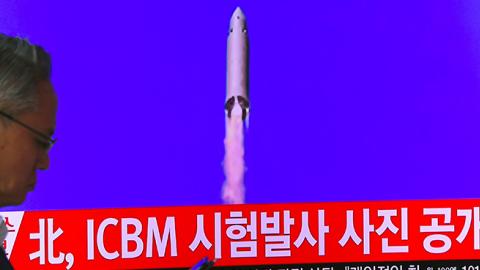Tuesday, North Korea successfully launched an intercontinental ballistic missile capable of reaching the continental United States. One day later, Pyongyang announced yet a further advance in its nuclear program, allowing its missiles to withstand the extreme heat and pressure upon re-entering the Earth’s atmosphere. In response, the top American military commander in South Korea declared that the United States was prepared for war.
The nightmare that American policymakers feared 20 years ago—a nuclear-armed North Korea with ballistic missiles that can hit America, and obliterate our treaty allies in Asia—is now frighteningly real. Twenty years of American negotiators pursuing a combination of rational carrots and sticks has failed to change the behavior of a totalitarian hermit kingdom led by a family of brutal sociopaths.
What makes this nightmare scenario even scarier is that Donald Trump is both literally and figuratively the last man capable of stopping Kim Jong Un. The current American president is the sole decider on the planet who might be able to stop the slow-rolling nightmare of a gangster regime determined to end American hegemony in Asia, on the internet, and wherever else that the U.S. insists that the rule of law should be enforced. Yet President Trump is undisciplined and emotional and seems incapable of crafting any policy that can’t be summed up in less than 140 characters.
Yes, the peace and security of the world may all come down to Donald Trump—and experienced U.S. policymakers are terrified. For instance, former senior State Department official Wendy Sherman has “very little” confidence in Trump’s ability to manage the “high-risk” diplomacy the situation demands. “Trump has lost … credibility,” says Sherman, because “he says so many outrageous things all of the time.”
For Sherman, the Clinton administration’s policy director for North Korea, who was involved in negotiations over the 1994 Agreed Framework with Pyongyang, the answer to the North Korean nightmare is more diplomacy. Presumably, like the kind of negotiations that Sherman conducted to broker the Joint Comprehensive Plan of Action over Iran’s nuclear program.
Indeed, some policy hands, including former Secretary of State John Kerry, are already suggesting that the model for nuclear diplomacy with North Korea should be America’s nuclear diplomacy with Iran.
Got that? The way to stop North Korea from launching nuclear weapons on American cities and/or U.S. allies is to make a deal with the Hermit Kingdom patterned after the deal made with the Islamic Republic—which was brokered by the same team that led American policy down this path with North Korea in the first place.
The logic here may be difficult for ordinary mortals to parse. Direct negotiations didn’t work with the North Koreans, or else they wouldn’t be testing ballistic missiles and threatening American cities with nuclear annihilation. And that kind of diplomacy won’t restrain the Iranians, either, who have tethered their nuclear weapons program to the North Koreans while turning large swaths of the Middle East into a depopulated kill zone.
The fundamental problem isn’t that North Korean ruler Kim Jong Un is a lunatic—of course he is. A man who executed his top officials with anti-artillery, or has his half-brother assassinated in broad daylight, is advertising the fact that he’s a dangerous sociopath who doesn’t care what the world thinks.
Nor is the problem that American policymakers spent two decades kicking the can down the road and thereby emboldened American enemies. That critique is true enough – but it’s also too easy. Foreign policy, especially in a democracy, is often about postponing the inevitable and arranging it so that someone else has to clean up the mess.
What’s startling is that two decades later, so few people are willing to recognize the plain truth that North Korea’s sociopathic dictator is determined to shove in our faces: North Korea has the bomb, and it is able and willing to use it.
American statesmen, Democrat and Republican, have granted themselves permission to be so oblivious to plain facts, and are so detached from the natural course of things, that even after their obvious failures, they continue to believe that they are right—and that success would consist of continuing to do what they’ve already been doing. In fact, they’re doubling down—To solve North Korea, do more of Iran!
North Korea’s launch Tuesday is the culmination of a quarter of a century of failed American policy, afflicting both parties, through three administrations, that has brought the world to the brink of catastrophe. I don’t know if Trump has special abilities that will help him navigate what may soon turn into a major disaster. He tried to work with the Chinese who now clearly think a nuclear North Korea is less of a problem than a reunified Korean peninsula. Beijing, therefore, is a nonstarter, and the United States, as Trump has tweeted, will have to solve it on its own.
My hope is that Donald Trump knows something from the real estate business, or Queens, or he learned something along the way that’s not taught in the fancy graduate school programs, like Johns Hopkins and Georgetown, that produce American “strategists.” Because those are the people—whose vanity and self-love come in epic proportions—who put Americans and the rest of the world in the middle of this mess. And it’s certainly not diplomacy with Pyongyang that’s going to save the day. Give us anything but more Wendy Sherman and John Kerry. The peculiar paradox of statesmanship suggests that a reckless outsider who speaks his mind before fully calculating the cost might be the best hope our planet has left.



















